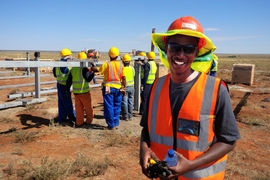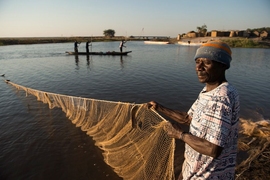More than half of the world’s poorest people live on small farms in rural areas of developing countries, accounting for over 2 billion people living on around two dollars a day.
Many of the hardships of smallholder farmers are the result of a long list of systemic issues spanning the agricultural supply chain. First, farmers cannot secure loans from the bank, forcing them to rely on loan sharks with high lending prices. Once they’ve received the necessary capital, farmers lack information on things like weather forecasts, pest attacks, optimal nutrient application, and current market prices. Finally, during the small window of time they have to sell crops before spoilage, farmers often lack direct access to buyers, forcing them to go through the same exploitive intermediaries who gave them the loan to begin with.
For the last two years, the social enterprise Ricult has been empowering these farmers with an accessible platform that gives them the tools and insights they need to improve their lives.
Farmers can use Ricult’s platform to secure credit, attain inputs such as seeds and fertilizers, monitor weather forecasts, and connect directly with buyers to sell their crops. Further, the platform helps farmers maximize their yields by providing personalized advice for growing crops based on soil tests.
“Farmers are at the bottom of the pyramid in developing countries, so if you want to drive these countries forward and reduce inequality, you have to transform the agricultural sector,” says Ricult co-founder Aukrit Unahalekhaka SM ’16. “There’s so much innovation and tech disrupting the U.S. agricultural industry, so we thought, ‘Why isn’t the same thing happening for people at the bottom of the pyramid in developing countries?’”
The company was founded when Unahalekhaka, who’s from Thailand, and Usman Javaid MBA ’15, who’s from Pakistan, separately pitched the idea of using mobile technology to help smallholder farmers in their home countries as part of a social enterprise class in the Media Lab. The similarities of their pitches made them realize the plight of smallholder farmers was a global phenomenon, so they teamed up to tackle it. As they explored the problem further at MIT, they partnered with co-founder Jonathan Stoller ’16 SM ’16, who now serves as Ricult’s chief technical officer, and co-founder Gabriel Torres ’08, who serves as chief strategy officer.
The founding team began testing features with a growing number of smallholder farmers in rural areas of Pakistan and Thailand. Today, Ricult is working with almost 10,000 farmers. The number of users nearly doubled last month when Ricult concluded a pilot trial and made the platform available across Thailand, and the founders aim to have more than 100,000 people using the solution by the end of 2019.
Operating a company with such a large potential reach and a multifaceted solution might otherwise require vast resources, but Ricult is a team of just 25 people that has built out its platform by establishing partnerships with existing players in the agricultural industry.
That strategy — in addition to the rapid proliferation of cell phone ownership in the developing world — has helped Ricult bring efficiencies to agricultural supply chains and lift thousands of families out of extreme poverty.
Partnering for change
Smallholder farmers can use Ricult’s platform through an app on a smartphone or SMS messaging on a feature phone. Or, if they don’t own a phone but have access to one, they can receive information through a voice call.
To register for the service, Ricult requires users to enter their farm’s geocoordinates. The company partners with smartphone owners in local communities to help register farmers who don’t have smartphones.
Ricult is then able to secure loans for farmers by using weather and satellite data to forecast a farmer’s yield and give banks an alternative to credit scores. Unahalekhaka says the large banks Ricult has partnered with in Pakistan and Thailand offer farmers loans for much cheaper than unofficial brokers, who can charge interest rates as high as 200 percent.
Once a farmer’s credit application is approved, independent agricultural experts — often professors from local universities that partner with Ricult — visit the farm and conduct soil testing to help Ricult generate a product list for each farmer to consider. From there, farmers can enter Ricult’s digital marketplace and purchase seeds, fertilizers, and pesticides, which are sourced directly from large international brands. The products are delivered directly to the farm free of charge because Ricult, once again, partners with members of the local agricultural ecosystem in these communities.
“The worst thing you can do when you’re building a new solution in our part of the world is build everything from scratch,” says Javaid, who was born and raised in Pakistan. “The most efficient way to do things is to leverage the existing infrastructure and improve it. That’s our focus. We don’t hire people on our payroll; they’re already doing this for a living. We just enable them with digital tools and they do what they always do, just more efficiently.”
Throughout the growing process, Ricult offers farmers insights such as the optimal time to sow seeds and how much of a specific nutrient to apply. And when farmers are ready to sell their crops, Ricult connects them directly with large food-processing companies, again eliminating the brokers in the middle. Ricult takes a small percentage of each food-processing company’s purchase.
“The agricultural value chains in developing countries are very strongly linked with each other,” Javaid explains. “You can’t just address one part of the problem and hope the rest of the problem will go away. If the farmer still has to go back to the middleman to sell his crops, the middleman won’t buy his crops if he hasn’t taken a loan from him. It’s a circle that, unless you break the whole circle, you can’t make space for yourself.”
The data that Ricult collects to help farmers are also of value to large organizations involved in the agricultural sectors where Ricult operates. In fact, most of Ricult’s partnerships are built around the company’s ability to collect data in one of the most data-deprived areas of the world’s economy.
“I think we’re solving a huge pain point in the agricultural sector, not just for the farmers, but for different stakeholders as well,” Unahalekhaka says. “They’ve always been looking for a solution like this to ease their efficiencies, so when we went to the banks and buyers, they got it right away. We provide a clear value proposition.”
The founders say their time at MIT helped them uncover those pain points. Unahalekhaka and Javaid took classes at the Sloan School of Management and the Martin Trust Center, and they participated in programs like the MIT $100K Pitch competition, the Rabobank-MIT Food and Agribusiness Innovation Prize, and MIT delta v to refine their ideas. Unahalekhaka also held a Legatum Center fellowship that covered the expenses of frequent international flights, allowing him to do vital on-the-ground market research on farmers who lack a digital footprint.
Empowering the underserved
As a double-bottom line company, the founders need to build a sustainable business as they continue to pursue a partnership model the company describes as “a hand-up rather than a hand-out approach” to helping farmers.
So far, that approach has worked: Unahalekhaka says Ricult’s services have boosted farmers’ crop yields by an average of 50 percent, while the farmers’ profits have risen 30 to 40 percent. The company is planning a big marketing push soon and has gotten requests to expand to several countries across south Asia.
But for right now, the Ricult team wants to make sure its platform is having the biggest possible impact in Pakistan and Thailand — countries with around 40 million farmers combined.
“A 40 percent increase in profits has a huge impact on these farmers’ lives,” Unahalekhaka says. “It means they can afford schooling and health care for their children, so we’ve started to see a ripple effect in the community. Before the farmer had to decide, ‘Should I send my kid to school or should I save that money to pay for food or health care?’ All of those things are necessary for a quality life. With more money, they don’t have to make those tough choices anymore.”









